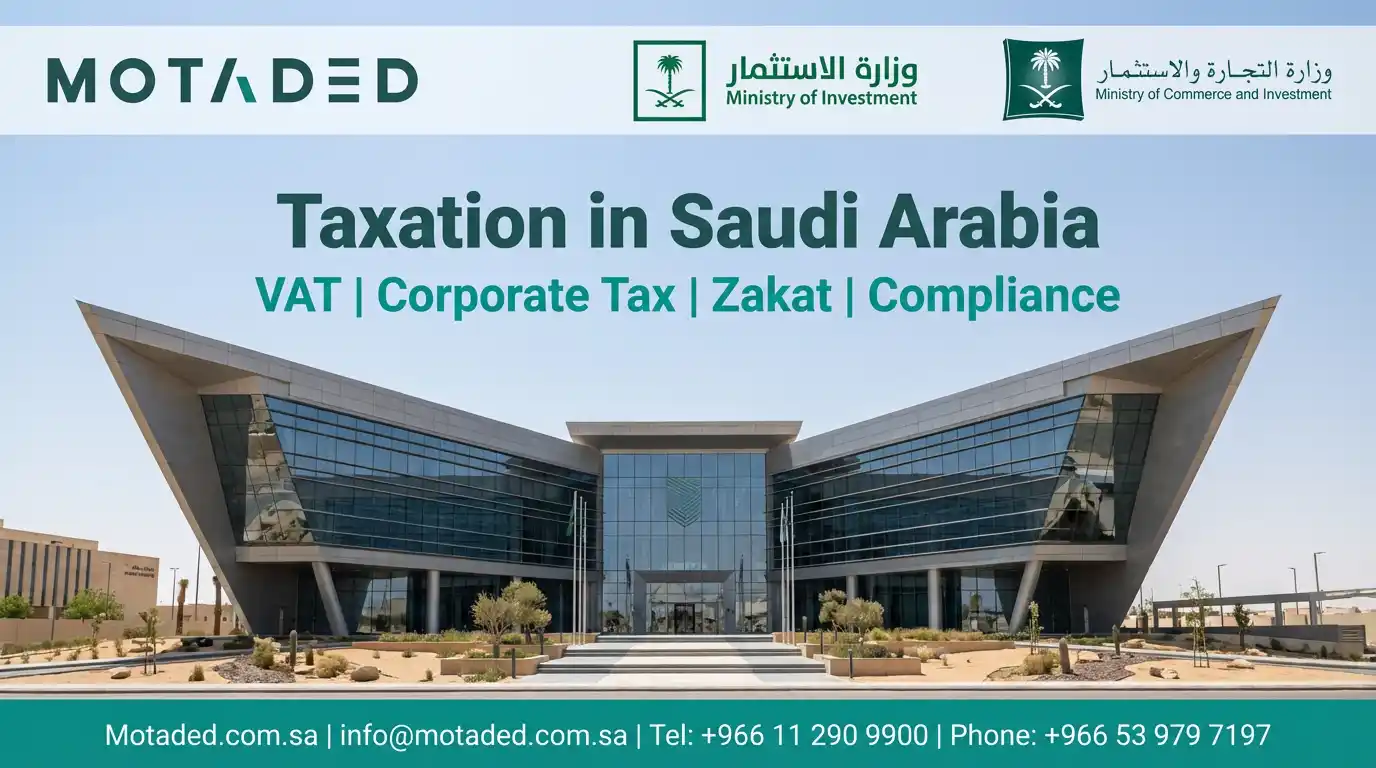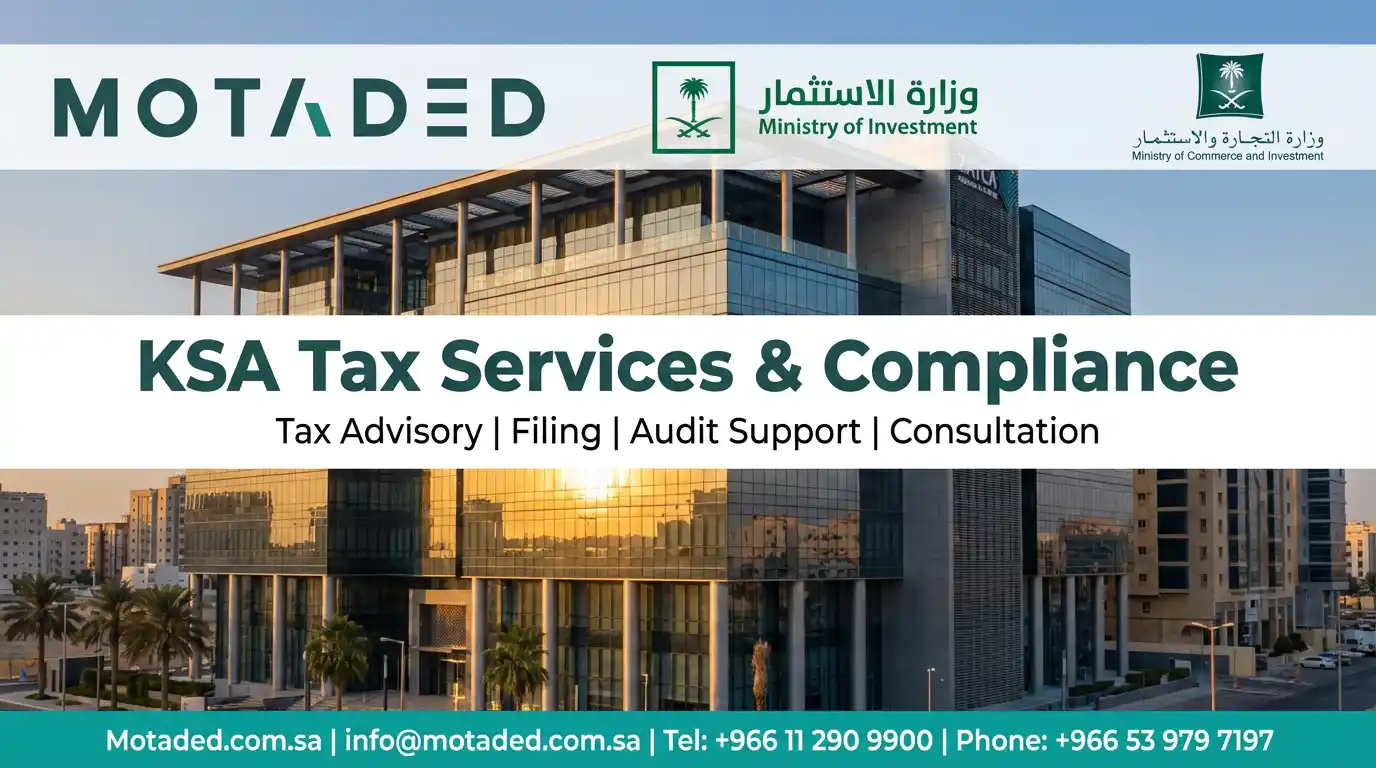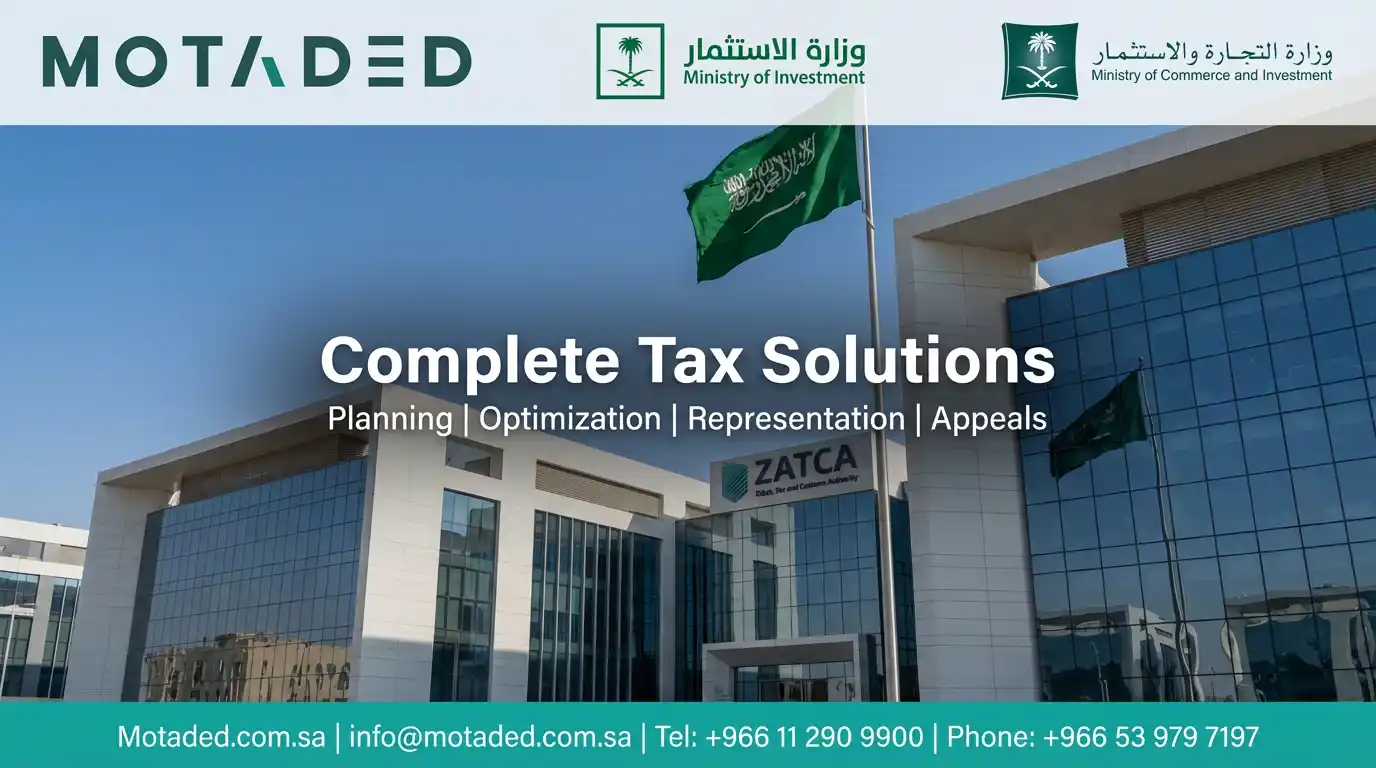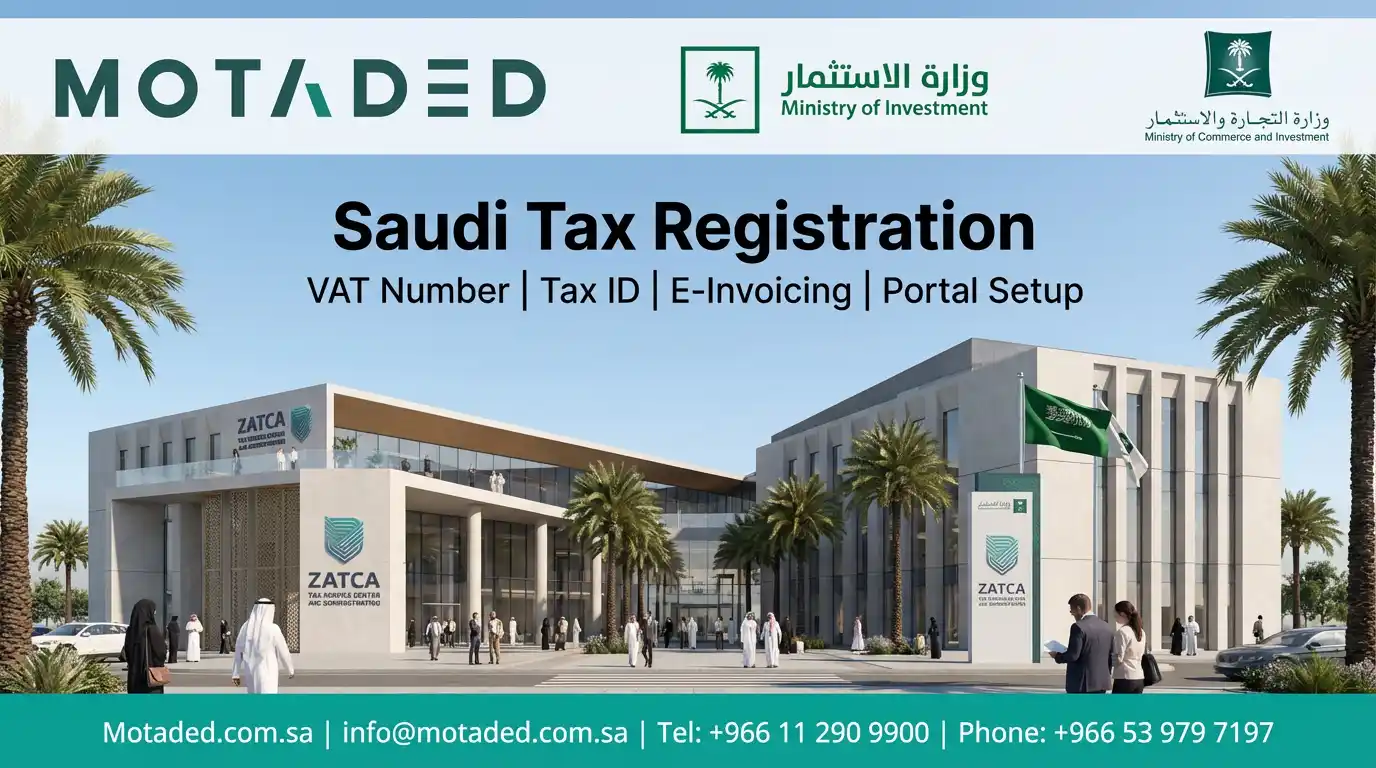Tax Sovereignty 2026: The Encyclopedic Thesis on the Tax and Zakat System in the Saudi Fortress
Understanding the Tax System in Saudi Arabia in 2026 represents the fundamental pillar for protecting the financial solvency of transcontinental billion-dollar enterprises. Tax compliance is no longer merely an accounting procedure; it has become a proactive process of Constructing a sovereign financial strategy aligned with the massive economic transformation led by Vision 2030. At Motaded, we believe that mastering the tools of Compliance with the Zakat, Tax and Customs Authority (ZATCA) is what grants investors operational sovereignty. The 2026 legislative environment provides exceptional incentives within the framework of Freedom of Ownership in Saudi Arabia 100% Foreign Ownership, making the Kingdom the most transparent and attractive financial fortress for global investment capital.

1. The Core Philosophy of the Tax System in Vision 2026
The philosophy of taxation in the Kingdom for 2026 is based on the principle of "Sovereign Sustainability and Resource Diversification," where the tax system is designed as a development engine rather than a mere collection tool. As a leading Consulting Firm in Saudi Arabia for Investors, we observe that the shift toward comprehensive digitalization and e-invoicing has established the rules of informational integrity in all commercial transactions. The state aims, through this sovereign regulation, to reduce dependence on oil revenues and create a fair competitive environment that ensures the growth of both SMEs and major corporations, while maintaining strong national financial solvency to support trillion-dollar projects.
Sovereignty in 2026 mandates establishments to adopt smart accounting systems that link in real-time to the ZATCA data center. At Motaded, we guide our clients to exploit the tax benefits available in Special Economic Zones (SEZs), which provide exemptions reaching 0% on certain strategic activities. Joining this system means your activity will be part of a digital economic fortress, where cash flows are managed with absolute integrity ensuring the protection of your assets from operational risks, granting you procedural prestige before international banks and global regulatory bodies, and consolidating your position as a partner in building the 2026 Saudi economic future.
2. Digital Tax Harvest: Solvency and Compliance Statistics 2026
To ensure absolute informational integrity, the following table documents the efficiency of collection and tax compliance for 2026 according to data from ZATCA and the Saudi Central Bank:
| Tax Performance Indicator 2026 | Achieved Value (or %) | Annual Growth Rate | Documenting Authority |
|---|---|---|---|
| Total Zakat and Tax Revenues | +410 Billion SAR | 12.5% | ZATCA |
| E-Invoicing Compliance Rate | 99.4% | Total Sovereign Shift | SAMA |
| Registered VAT Entities | +1,250,000 Entities | 15% | Ministry of Commerce |
| Tax Refund Processing Speed | 5 Working Days | Procedural Leadership | ZATCA |
These metrics reflect the regulatory solvency enjoyed by the Saudi financial fortress, providing a secure environment for international investors to effectively manage their cadres and investments.
3. Sovereignty of Value Added Tax (VAT) at a 15% Rate
VAT in 2026 represents the backbone of non-oil revenues, with the rate stabilized at 15% to ensure steady cash flows for sovereign projects. Sovereignty here lies in the system's ability to absorb all supply chain loops with extreme informational integrity. At Motaded, we handle the Formulating of VAT optimization strategies for our clients, ensuring they reclaim input tax efficiently and minimize the impact on working capital.
Compliance with VAT in 2026 requires extreme precision in classifying supplies between taxable, zero-rated, and exempt. Informational integrity in this sector means building non-tamperable digital records linked directly to the "Fatoora" platform. We assist companies in obtaining specialized licenses for importing exempt goods, granting them a competitive cost advantage. Sovereignty in VAT management means protecting the facility's operational solvency and avoiding billion-dollar fines resulting from accounting errors, consolidating the commercial entity's prestige in the heart of the Saudi economic fortress.
4. Governance of Withholding Tax (WHT) and International Transactions
Withholding Tax in 2026 has become the sovereign tool for regulating capital outflows in exchange for cross-border technical and consulting services. Rates range between 5% and 20% based on the service type, serving as a core pillar of the Kingdom's financial sovereignty. At Motaded, we help investors understand the Steps for Business Setup in KSA and their relationship with international Double Taxation Avoidance Agreements (DTAs), ensuring no double taxation occurs and maximizing net profits for international groups.
Compliance with procedural integrity standards in remitting WHT during the first ten days of the following month is a sovereign requirement for legal stability. In 2026, these transactions are monitored via the unified bank linking system, ensuring absolute transparency. We guarantee our clients that their international contracts are designed to protect their financial solvency, grant them priority in obtaining tax clearance certificates, and consolidate the facility's trade sovereignty against global tax fluctuations, achieving creative sustainability in structuring consulting and technical contracts.
5. Zakat Sovereignty for Saudi and GCC Investors
Zakat in 2026 represents the spiritual and financial pillar of the Saudi economy, applied at a rate of 2.5% on the Zakat base of entities owned by Saudi and GCC citizens. Zakat sovereignty means directing these funds toward sovereignly documented social development projects. At Motaded, we provide strategic consultations for companies wishing for Company Formation in Saudi Arabia with mixed ownership, ensuring precise distinction between the share subject to Zakat and the share subject to Corporate Income Tax.
Participating in building the Zakat base requires high informational integrity in submitting audited balance sheets. In 2026, the state grants incentives to facilities contributing to Zakat-approved CSR initiatives. We assist companies in building Zakat files that reflect their financial and social solvency, granting them a foothold in billion-dollar government projects that mandate valid Zakat compliance certificates. Sovereignty in Zakat management means building economic entities fortified by values and capable of leading societal transformation, achieving sustainable growth and blessing for the billion-dollar investor in 2026.
6. Corporate Income Tax (CIT) for Foreign Firms: Solvency and Equity
Foreign companies in 2026 are subject to a fixed income tax of 20%, a rate characterized by global competitiveness and procedural integrity. Tax sovereignty here means protecting the local market and ensuring international firms contribute to the national infrastructure. At Motaded, we Construct accounting structures that ensure accurate calculation of taxable profits, while utilizing carried-forward losses and sovereignly deductible expenses.
In 2026, the Saudi tax system relies on "Proactive Compliance" technologies, alerting companies to tax risks before they occur. Excellence in this path requires recruiting Professional Staff in Saudi Arabia specialized in international tax law. We provide technical support services to help establishments draft their annual tax returns. Sovereignty here lies in the ability to protect the investor's financial solvency through sound and compliant tax planning, enhancing investment trust in the billion-dollar Saudi business environment of 2026.

7. Sovereignty in Real Estate Transaction Tax (RETT) 2026
Real estate transactions in 2026 act as the construction engine for urban renaissance, with a tax of 5% imposed on all ownership transfers. Sovereignty here lies in protecting real estate wealth and preventing unproductive speculation that might harm citizens' financial solvency. At Motaded, we assist real estate investors in obtaining exemptions designated for accredited real estate developers, ensuring them leadership in executing billion-dollar housing projects.
Compliance with "Real Estate Integrity" standards is a sovereign requirement for continuity in 2026. Informational integrity in asset valuation and documenting deals via the ZATCA real estate platform ensures the investor protects his legal rights. We provide legal support to ensure tax payment before the property transfer (Ifrag), facilitating expansion in billion-dollar real estate portfolios. Sovereignty in the real estate sector means building a transparent trading environment protected by regulations, facilitating the attraction of global real estate funds and consolidating the facility's position as a partner in building the Saudi fortress.
8. Governance of Excise Tax and Health Sovereignty
Excise Tax in 2026 has become the protective shield for public health and environmental integrity, imposed at rates up to 100% on harmful goods like tobacco and energy drinks. Sovereignty here lies in using the tax system as a tool to change consumption patterns and protect human cadres from chronic diseases. At Motaded, we facilitate the registration of tax warehouses to ensure our clients in the FMCG sector comply with sovereign regulations.
In 2026, the Kingdom grants sovereign accreditations to facilities committed to the digital tax stamps system to enhance oversight and prevent smuggling. Informational integrity in documenting the movement of excise goods is the pillar upon which collection efficiency is built. We assist companies in Organizing their tax files to comply with customs and tax regulations, ensuring the investor a flexible operational solvency capable of facing regulatory challenges. Sovereignty lies in possessing tools for managing taxable inventory with integrity and professionalism.
9. Sovereignty in Double Taxation Avoidance Agreements (DTA) 2026
DTAs signed by the Kingdom with over 60 countries serve as the sovereign incubator for transcontinental investments in 2026. Cooperative sovereignty means the investor's ability to repatriate profits and protect income from multiple taxation through official channels fortified by international treaties. At Motaded, we guide international groups to exploit these agreements, ensuring the protection of their billion-dollar investments in tech and energy sectors.
International investment in 2026 requires compliance with the International Tax Transactions Law which grants exceptional benefits to firms opening Regional Headquarters (RHQ) in the Kingdom. Procedural sovereignty ensures investors obtain Saudi tax residency certificates and activate tax reduction clauses in their home countries. We ensure our clients formulate precise ownership structures enhancing their chances for billion-dollar facilities, making the RHQ a fundamental pillar of economic solvency and national sovereignty in 2026.
10. Governance of E-Invoicing (Fatoora) and Digital Sovereignty 2026
The e-invoicing system in 2026 has reached the stage of total integration and real-time linking under ZATCA oversight. Digital sovereignty means the total elimination of the shadow economy and ensuring informational integrity in every invoice issued in the Saudi fortress. At Motaded, we assist international firms in Constructing their technical systems to align with Phase 2 (Integration Phase) requirements ensuring direct access to sovereign tenders.
In 2026, e-invoicing compliance is monitored via AI algorithms, ensuring financial accuracy sustainability. Informational integrity in digital data is what grants the facility absolute trust from regulatory and banking authorities. We provide technical and legal consultations for Tax Data Protection, opening horizons for building commercial partnerships fortified by sovereign systems that guarantee the rights of both buyer and seller in a world-class digital environment fitting the Kingdom's prestige in 2026.

11. Sovereignty in Transfer Pricing 2026
Transfer pricing regulations in 2026 have transformed into a sovereign sector aimed at preventing tax base erosion and ensuring fair profit distribution among related parties. Financial sovereignty means ensuring all inter-company dealings are conducted according to the "Arm's Length Principle." At Motaded, we assist multinational corporations in preparing the "Master File" and "Local File" to ensure compliance with strict sovereign regulations and protect the facility's tax solvency.
Investing in transfer pricing structuring in 2026 grants the facility access to government initiatives for international tax information exchange. Informational integrity in reports is the pillar upon which reliability is built before the OECD. We assist companies in building compliance systems aligned with BEPS standards, enhancing the facility's operational solvency and making it part of the Kingdom's sovereignty in combating global tax evasion. Investing in pricing accuracy is an investment in billion-dollar legal stability for 2026.
12. Governance of Customs Duties and Logistical Sovereignty 2026
The link between taxes and customs in 2026 represents the pillar of the Kingdom's "Logistical Sovereignty," where ZATCA ensures the fluidity of goods through modernized ports and airports while accurately collecting sovereign duties. At Motaded, we assist importers in Company Registration in Saudi Arabia and obtaining "Authorized Economic Operator" (AEO) status, ensuring goods reach Saudi markets without delay and at the lowest customs costs.
In 2026, customs data are linked with VAT returns to ensure informational integrity and origin tracking. This sovereign organization raises the prestige of Saudi ports and achieves the Kingdom's targets as a global logistical hub. We provide consultations for Supply Chain Governance to ensure eligibility for customs exemptions for national industries. Sovereignty in the customs sector means building a strong commercial identity for the facility capable of competing in regional markets, ensuring sustainable cash flows and financial solvency in 2026.

13. Sovereignty in Tax Objections and Dispute Activities
Committees for the Resolution of Tax Violations and Disputes in 2026 have become the sovereign fortress for protecting taxpayers' rights and ensuring system justice. Judicial sovereignty lies in resolving billion-dollar disputes with specialized expertise ensuring procedural integrity and speed in rulings. At Motaded, we guide investors to follow "Amicable Objection" and digital tax litigation paths, ensuring the recovery of their financial rights and protecting their corporate reputation.
Compliance with "Judicial Transparency" standards is a sovereign condition that raises the facility's credit ranking in 2026. Informational integrity in submitting legal briefs ensures the clarity of the facility's tax position before the resolution committees. We assist companies in designing innovative tax defense strategies that achieve a balance between compliance and profit protection, granting them a competitive edge in the billion-dollar market. Excellence in dispute management is a guarantee for ethical and professional solvency, making the establishment a solid entity capable of facing regulatory challenges with absolute sovereignty.
14. Governance of Tax Incentives in Special Economic Zones (SEZ)
Special Economic Zones in 2026 represent the diplomatic engine for qualitative billion-dollar investments, granting sovereign tax incentives including a 5% corporate income tax for 20 years. Investment sovereignty here means the ability to negotiate and attract billion-dollar capital through official channels fortified by international treaties. At Motaded, we assist international firms in joining these zones and complying with ECZA Regulations updated for 2026.
In 2026, facility performance within zones is monitored via sovereign KPIs ensuring the achievement of local added value for the national economy. Informational integrity in "Substantial Economic Activity" reports is the pillar upon which billion-dollar alliances are built. We provide logistical and consultative support services to maximize our clients' benefit from these unique tax advantages. Sovereignty in the SEZ sector means building cross-border economic relations immortalizing the facility's name as a strategic partner in the Saudi renaissance.
15. Sovereignty in Tax Consulting and Billion-Dollar Compliance
Tax consulting activities provided in 2026 have become the thinking brain for billion-dollar business in the Kingdom. Professional sovereignty means providing solutions based on deep knowledge of Saudi regulations and informational integrity. At Motaded, as a leading firm in Management and Tax Consulting, we provide a model for commitment to procedural sovereignty, consolidating international investors' trust in the Kingdom's legislative environment and its ability to protect their capital.
Compliance with the updated Code of Ethics for Certified Public Accountants of 2026 is a sovereign condition ensuring the quality of consulting outputs. Informational integrity in financial reports protects company interests and facilitates billion-dollar M&A operations. We assist global consulting offices in obtaining professional licenses and localizing their expertise, raising the knowledge solvency of the Saudi market. Sovereignty in the consulting sector lies in the ability to formulate successful tax strategies contributing to Vision 2030 targets, making professionals true partners in the prosperity journey for 2026.
16. Governance of Capital Gains Tax and Investment Sovereignty
Investment activity in stocks and real estate in 2026 represents the pinnacle of wealth management transformation, with a 20% capital gains tax imposed on non-residents. Investment sovereignty means protecting the market from rapid fluctuations and ensuring growth sustainability in the Saudi Stock Exchange (Tadawul). At Motaded, we assist investment firms in RHQ Formation to ensure benefit from tax incentives dedicated to long-term investments.
In 2026, financial trades are linked to sovereign disclosure systems to ensure informational and financial integrity. Sovereignty here lies in possessing investor data within the Saudi digital fortress, facilitating analysis and oversight. We provide consultations for Portfolio Governance and Property Protection, granting the facility strategic immunity against financial cyber attacks and enhancing the trade solvency of global brands aspiring for leadership in the Saudi market for 2026.

17. Sovereignty in "Green Tax" and Sustainability Activities 2026
Environmental activities in 2026 have transformed into a sovereign economic sector based on the "Carbon Tax" principle and circular economy stimulation. Environmental sovereignty means imposing fees on emissions while providing tax credits to eco-friendly facilities. At Motaded, we assist firms in energy and industrial sectors in obtaining "Carbon Credits" and dealing with the National Center for Environmental Compliance, ensuring compliance with sovereign Green Tax regulations.
Investing in carbon capture technologies in 2026 grants the facility access to billion-dollar government initiatives supporting sustainability. Informational integrity in emission reports is what raises the establishment's ranking in global financial markets (ESG). We provide environmental tax audit services to ensure activity alignment with the Kingdom's international obligations in the Paris Climate Agreement. Sovereignty in the green tax sector means building a sustainable industry fortified by innovation, achieving financial and environmental solvency for the investor in 2026.
18. Governance of Permanent Establishment (PE) and Service Tax Sovereignty
Permanent Establishment criteria in 2026 have become the governor for tax sovereignty over foreign firms executing projects exceeding 6 months in the Kingdom. Procedural sovereignty requires registering these entities for tax immediately upon exceeding the specified duration to ensure integrity in collecting taxes on locally generated profits. At Motaded, we assist international construction and service firms in activating the sovereign National Address and linking with ZATCA to ensure precise compliance with PE standards.
In 2026, the presence of foreign companies is monitored via sovereignly documented visa and contract systems ensuring transparency and informational safety. Sovereignty here lies in the ability to execute billion-dollar deals with tax clarity that prevents random assessments. We provide consultations to improve operational structure quality and reduce unintended tax presence risks, enhancing the facility's financial solvency through proactive planning, consolidating the prestige of the Saudi tax system as a global model in 2026.
19. Sovereign Inquiries on Taxation in Saudi Arabia 2026 (FAQ)
Here are the 9 fundamental inquiries ensuring your informational sovereignty and procedural integrity when dealing with the tax system in the Saudi fortress for 2026:
- What is Fatoora platform's role in supporting informational integrity? It is the sovereign engine for linking commercial invoices to ZATCA systems in real-time to ensure transparency and prevent tax evasion.
- Are individual salaries subject to income tax in 2026? There is no personal income tax on salaries (Saudi or resident) in the Kingdom for 2026, enhancing cadre financial solvency.
- How is "Tax Refund" activated for exporters in 2026? It is done automatically via the digital ZATCA system upon return submission, ensuring rapid liquidity flow for facilities.
- What is PDPL's impact on tax data? It ensures personal record and payroll privacy and mandates high encryption standards on Authority platforms to ensure digital sovereignty.
- Can a foreign investor pay tax dues in installments in 2026? Yes, 2026 regulations grant flexibility in scheduling dues for compliant facilities to enhance administrative sovereignty and business continuity.
- How do DTAs contribute to cost reduction? By providing reduced WHT rates and avoiding paying tax twice on the same billion-dollar income.
- What is the penalty for not registering for VAT? A grave violation of procedural integrity starting with major financial fines and leading to CR and sovereign service freezing.
- Can profits be repatriated without paying WHT? It depends on the transfer type (dividends, management fees, interest) and DTA provisions signed with the recipient's country.
- What is the advantage of consulting Motaded when filing a tax return? Ensuring procedural integrity, maximizing legitimate refunds, and absolute compliance with all 2026 ZATCA system updates.

20. Executive Summary and Financial Sovereignty 2026
Associating with the tax and Zakat system in Saudi Arabia for 2026 is the decisive step toward building a sustainable facility in the new global economic fortress. Stunning digital development via ZATCA and Fatoora platforms, procedural sovereignty in tax base protection, and legislative clarity under Vision 2030 have made the Saudi financial environment the most attractive for billion-dollar capital and firms aspiring for growth. At Motaded, as your strategic and sovereign partner, we are committed to overcoming all obstacles and providing technical support to ensure your success and sustainable growth in the land of opportunity.
Your successful investment today begins with understanding taxation's role as a sovereign partner in protecting your operational solvency. We ensure absolute compliance and procedural sovereignty at every step, confirming that the Saudi financial fortress opens its doors to every ambitious professional leader. With proper planning and a refined Market Entry Strategy in KSA, your billion-dollar ambitions will transform into a reality building the future global economy from the heart of Riyadh for 2026, the capital of money, business, and tax sovereignty.